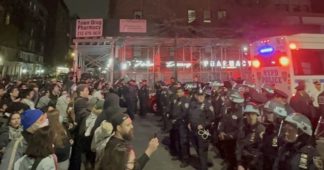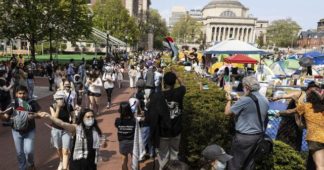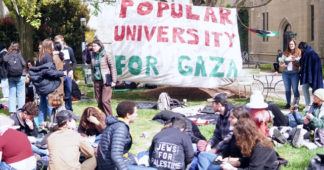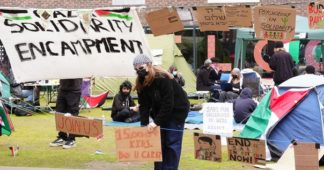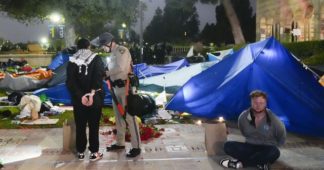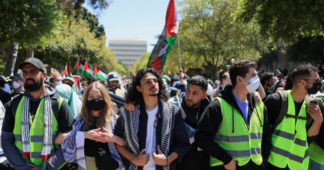Officers in military gear fired flash-bang munitions and used batons to clear a nonviolent encampment calling for an end to Israel’s U.S.-backed war on Gaza.
By Jake Johnson
Police reportedly arrested dozens of students as they advanced on the encampment.
“They’d rather shoot kids than stop this genocide,” said one observer.
Police fire multiple impact munitions at protestors. 4:38am pic.twitter.com/960I4iVMtt
— Sergio Olmos (@MrOlmos) May 2, 2024
Graeme Blair, an associate professor of political science and member of Faculty for Justice in Palestine at UCLA, told the university’s student newspaper early Thursday that police officers “violently dragged” students from the Gaza solidarity encampment and that some demonstrators were “visibly injured.”
“Their blood is on Gene Block and the UC administration’s hands for a series of catastrophic decisions over the last two days,” said Blair, referring to UCLA’s chancellor. “It did not need to be this way.”
Blair said UCLA professors inside the encampment “plan to be arrested alongside students who have done nothing but talk about a genocide taking place in Palestine.”
Matt Barreto, a professor of Chicano studies and political science, told the Los Angeles Times that “our job is to stand up for their First Amendment rights, their rights on their own campus.”
Police arrest protestor 4:55am pic.twitter.com/udgS0Terc9
— Sergio Olmos (@MrOlmos) May 2, 2024
The police raid came 24 hours after Los Angeles officers and campus security stood by as a pro-Israel mob violently attacked pro-Palestinian demonstrators. Dozens of students were reportedly taken to hospitals for treatment following the assault.
The Daily Bruin, whose student journalists were on the scene, reported Thursday that police “continued to detain protesters in the encampment as the clock struck 4:00 am, marking one week since the initial erection of the solidarity encampment by the UC Divest Coalition and Students for Justice in Palestine at UCLA.”
“At 4:05 am, a slew of loud noises presumed to be flash bangs went off,” the newspaper added. “Dozens of protesters exited the encampment by climbing through the bushes near Powell Library onto the Janss Steps lawn. Protesters chanted, ‘Gene Block, you can’t hide, we charge you with genocide’ and, ‘We are students’ as smoke from the presumed flash bangs thickened above Dickson Plaza.”
The police crackdown at UCLA is part of a broader wave of police repression on campuses nationwide as universities refuse to grant their student’s calls for divestment from companies profiting off Israel’s assault on Gaza. More than 1,000 student demonstrators have reportedly been arrested across the U.S. so far.
“It is no accident that this indefensible police crackdown comes in service of an indefensible war,” The Intercept‘s Natasha Lennard wrote in a column Wednesday following the violent police raid at Columbia University in New York. “The very extremity of protest repression speaks to desperation on the part of institutions of the American establishment.”
“Israel’s decimation of Gaza has—at least for millions more people—given lie to the redemptive myths of the post-World War II political liberal order,” Lennard added. “Young people, even the children of the elite, even children of Zionists, are standing with Palestine. Their peaceful acts of protest count as disruptive because they count as un-American—which should be a badge of honor amid a U.S.-backed genocide.”
We remind our readers that publication of articles on our site does not mean that we agree with what is written. Our policy is to publish anything which we consider of interest, so as to assist our readers in forming their opinions. Sometimes we even publish articles with which we totally disagree, since we believe it is important for our readers to be informed on as wide a spectrum of views as possible.
